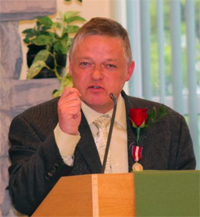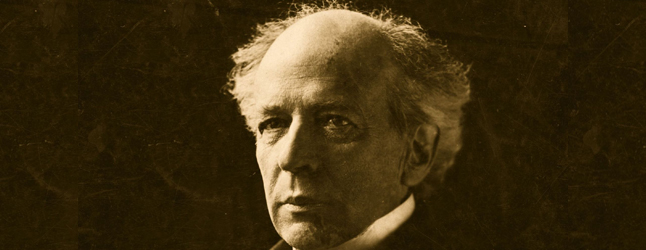
November 20 was Sir Wilfrid Laurier Day across Canada thanks to an Act of Parliament. It is the annual opportunity Canadians have to reflect upon the life and legacy of Laurier, Canada’s first French Canadian prime minister. Shortly after the 1891 election which saw Sir John A. Macdonald defeat his most worthy opponent the first prime minister died. The young Dominion was plunged into morning when her citizens learned that John A. had passed away at Earnscliffe on the evening of June 6, 1891. When the House of Commons met in the sad aftermath, Laurier rose and delivered the greatest tribute in Canadian history. On Sir Wilfrid Laurier Day 2014, falling as it does just short weeks before Macdonald of Kingston’s bicentennial day in January, an edited version of Laurier’s eulogy of the Father of Confederation from the new book, Canada Transformed: The Speeches of Sir John A. Macdonald, A Bicentennial Celebration, is found below.
Wilfrid Laurier: Sir John Macdonald now belongs to the ages, and it can be said with certainty, that the career which has just been closed is one of the most remarkable careers of this century … As to his statesmanship, it is written in the history of Canada. It may be said without any exaggeration whatever, that the life of Sir John Macdonald, from the date he entered Parliament, is the history of Canada … His actions always displayed great originality of views, unbounded fertility of resources, a high level of intellectual conceptions, and, above all, a far-reaching vision beyond the event of the day, and still higher, permeating the whole, a broad patriotism — a devotion to Canada’s welfare, Canada’s advancement, and Canada’s glory.
The life of a statesman is always an arduous one, and very often it is an ungrateful one. More often than otherwise his actions do not mature until he is in his grave. Not so, however, in the case of Sir John Macdonald. His career has been a singularly fortunate one. His reverses were few and of short duration. He was fond of power, and, in my judgment, if I may say so, that may be the turning point of the judgment of history. He was fond of power, and he never made any secret of it. Many times we have heard him avow it on the floor of this Parliament, and his ambition in this respect was gratified, as perhaps, no other man’s ambition ever was…
In his death, too, he seems to have been singularly happy. Twenty years ago I was told by one who at that time was a close personal and political friend of Sir John Macdonald, that in the intimacy of his domestic circle he was fond of repeating that his end would be as the end of Lord Chatham — that he would be carried away from the floor of Parliament to die.
How true that vision into the future was we now know, for we saw him to the last, with enfeebled health and declining strength struggling on the floor of Parliament until the hand of fate pinned him to his bed to die. And thus to die with his armour on was probably his ambition. Sir, death is the law — the supreme law … Death always carries with it an incredible sense of pain; but the one thing sad in death is that which is involved in the word separation — separation from all we love in life. This is what makes death so poignant when it strikes a man of intellect in middle age. But when death is the natural termination of a full life, in which he who disappears has given the full measure of his capacity, has performed everything required from him, and more, the sadness of death is not for him who goes but for those who love him and remain …
Today, we deplore the loss of him who, we all unite in saying, was the foremost Canadian of his time, and who filled the largest place in Canadian history…
Before the grave of him who, above all, was the Father of Confederation, let not grief be barren grief; but let grief be coupled with the resolution, the determination that the work in which the Liberals and Conservatives, in which (George) Brown and Macdonald united, shall not perish, but that though (a) United Canada may be deprived of the services of her greatest men, still Canada shall and will live.
About the author:
Arthur Milnes is an accomplished political speechwriter who has written for the prime minister and an award-winning journalist-historian who is the City of Kingston’s official Sir John A. Macdonald Bicentennial Ambassador through to the end of 2015. He is also the author of the forthcoming book, Canada Transformed: The Speeches of Sir John A. Macdonald, A Bicentennial Celebration, edited by Dr. Sarah Gibson and Arthur Milnes and published by McClelland and Stewart.




